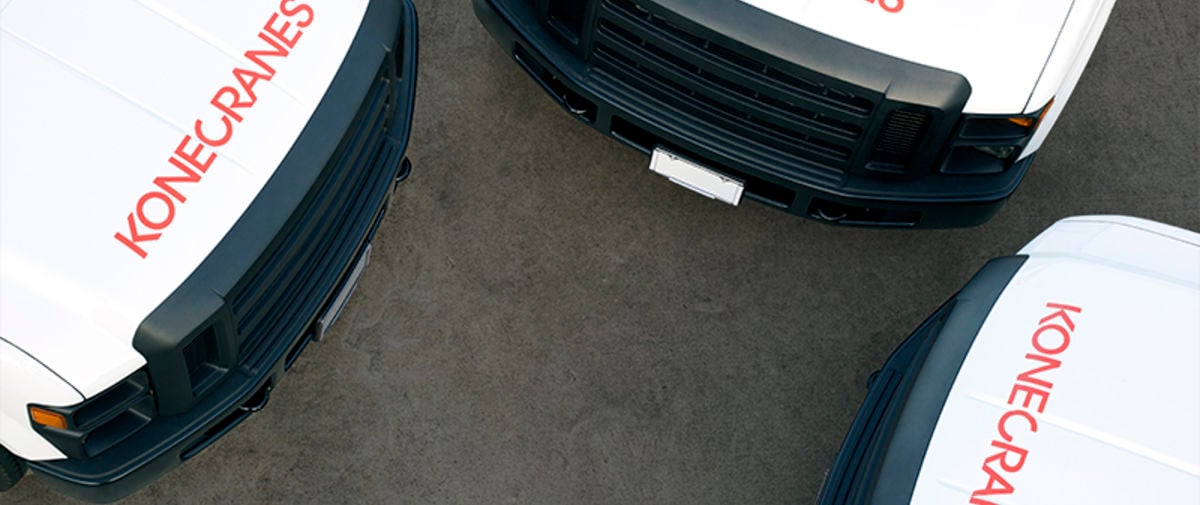A collaborative effort for energy efficiency
Energy Efficiency Day—held each year on the first Wednesday in October—is a collaborative effort of dozens of energy efficiency advocacy groups around the United States with a simple message: “Save Money. Cut Pollution. Create Jobs.”
The goal is to share tips, tools and stories that promote the multiple benefits of energy efficiency. According to the group, energy efficiency is the cheapest, quickest way to meet our energy needs, cut consumer bills and reduce pollution. Energy efficiency is also an economic engine, supporting over two million jobs nationwide in manufacturing, construction and other fields.
Service vehicle fleet improvements bring fuel consumption savings
Konecranes sustainability work is driven by our key stakeholders, their ambitions and needs as well as business opportunities that can be gained from driving the sustainability agenda. Let’s look at one area in particular: improvements in the Konecranes service vehicle fleet.
Konecranes Americas region represents half of the company’s total level of service vehicle fleet emissions. This is due to a number of factors, such as higher milage as well as having bigger vehicles and larger motor sizes than other regions.
Since the region began investing in more eco-efficient vehicles in 2018, it has seen fuel consumption decrease. In the United States alone consumption was reduced by 20 percent.
Smaller engines and tech solutions help fuel reductions
This reduction is due to a few different factors. First a decision was made to downsize the engines and seek improved efficiency. That decision led us to replace old V8 engines with smaller engines offering the same—or better—power with considerably less fuel consumption than the bigger engines. Those smaller engines are Ford’s EcoBoost® line of turbocharged, direct-injection petrol engines that are designed to deliver greater horsepower and torque while also providing greater fuel efficiency. We have also reduced the size of vehicles driven by non-operatives.
The second reason is telematics. We use a GPS tracking system in all service vehicles that tracks unsafe driving behaviors and allows management teams to coach in real time and be alerted to high-risk drivers. Unsafe driving behaviors often increase fuel consumption, so getting drivers to drive more safely means not only preventing potential vehicle collisions, but it also means reducing Konecranes environmental impact. In the past couple years, Konecranes driver collision rates have trended downward.
The GPS tracking system can also support service organization planning by mapping where service vehicles are located in respect to customer locations, which can in some instances identify the Konecranes technician closest to a customer and dispatch accordingly. These small features contribute to further reducing emissions.
The last reason is an investment in performance calibrations for our vehicles. Engine software calibrations are used to customize the vehicles in our fleet to optimize vehicle performance, fuel efficiency and safety.
Setting high targets
We have renewed our vehicle policy and have included measures and programs to reduce emissions and optimize the use of our vehicle fleet. We have set very high emission reduction targets for our whole operation as well as separate targets for the vehicle fleet. Konecranes will continue to invest in more fuel-efficient cars and route optimization with the goal of further reducing fuel consumption.
Overall, we are working to decarbonize our own operations. We maximize lifecycle value and eliminate the waste of resources, energy and time throughout the entire value chain. Substituting existing technology with lower-emission alternatives is a big opportunity for both Konecranes and our customers. Our portfolio offers improved resource and energy efficiency, a variety of low carbon power options and optimized maintenance, upgrades and modernizations to maximize lifecycle, performance and safety.
Konecranes makes lifting and material flows more productive and sustainable. Uncompromised safety, high ethics and inclusiveness drive us. We work for a decarbonized and circular world for customers and society.
